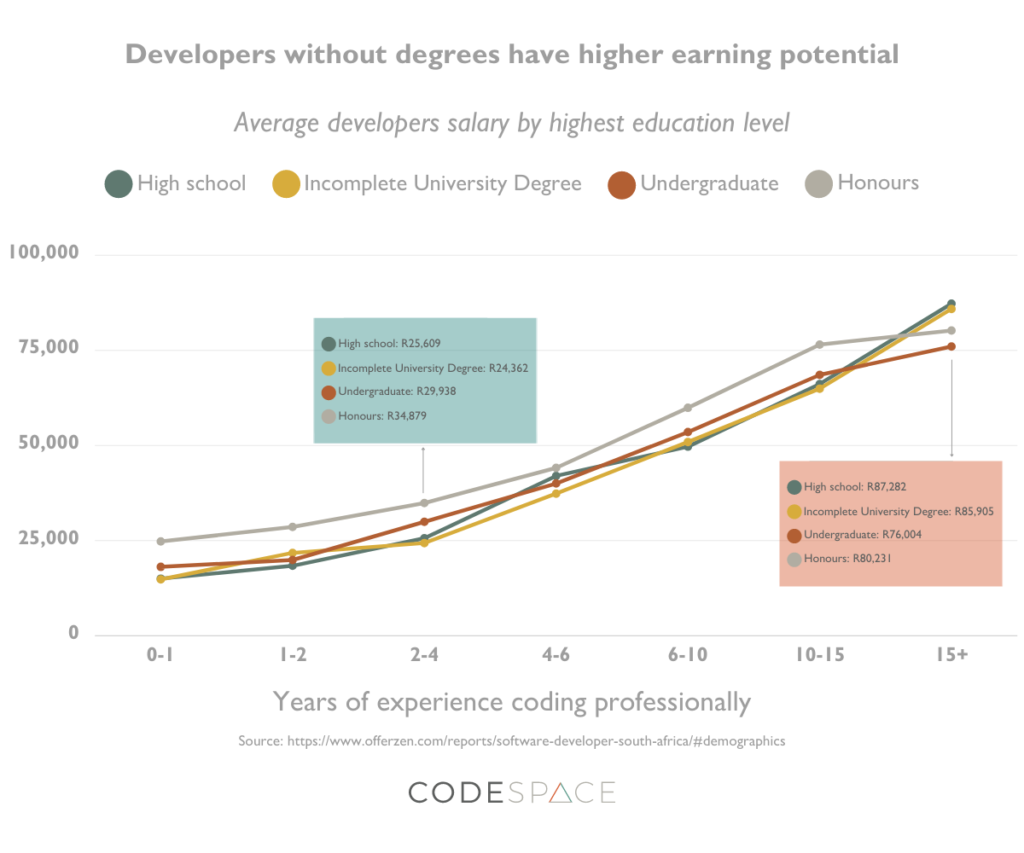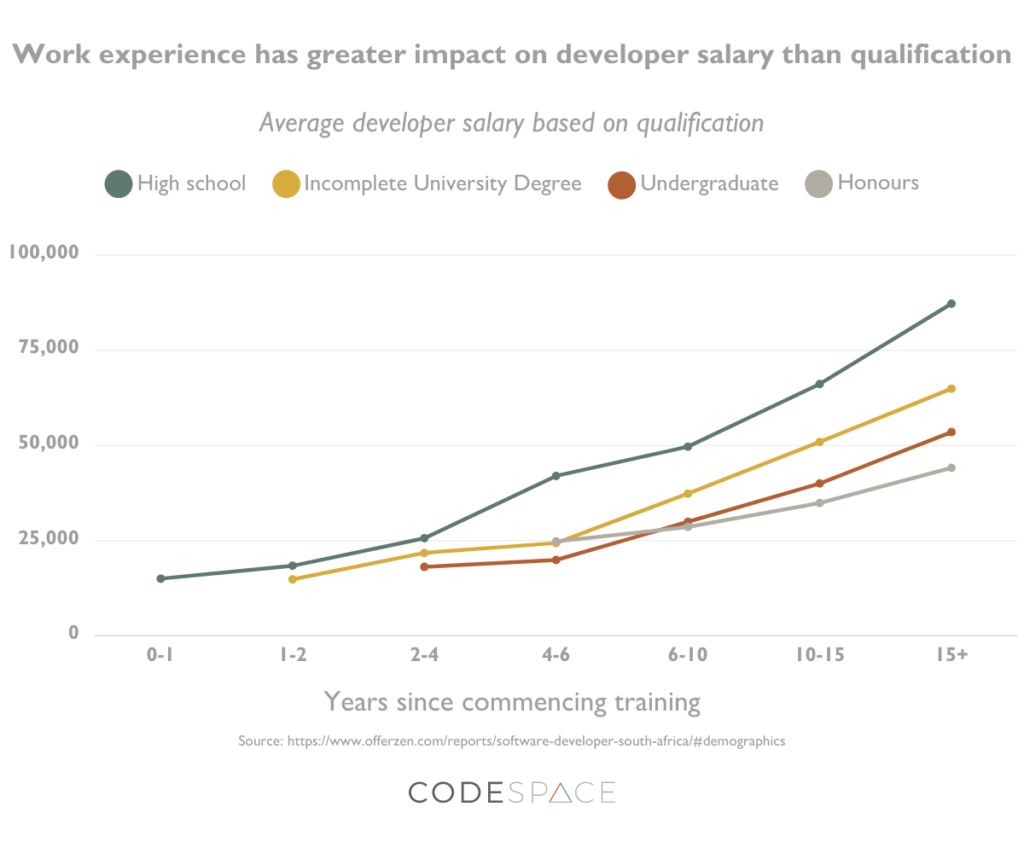
Choosing whether a degree or a certificate is the best way to land your dream job in the tech industry is an important career decision. There are pros and cons to each, so it is not an easy choice to make.
Finding advice can be difficult because the world of work no longer follows all the rules applied to previous generations.
We want to make your decision-making journey easier by busting some common myths surrounding landing a job in the tech industry, especially whether a degree or a certificate is the best option.
Myth One: You need a degree to get a job in tech.
False! It is a misconception that you need a degree to land a job in tech. The tech industry is moving away from requiring degrees.
Well-known tech giants like Apple, Google, and Tesla no longer require degrees for their tech jobs. Why? Because there is a mismatch between the skills that degree programs teach and what tech employers need.
Instead of requiring a degree to prove your skills, you will need a good portfolio of work to display your skills.
CodeSpace students who have completed a 500-hour Software Development course (typically over 6 to 12 months) are ready to get their first job as a developer. When applying for a job, they can show a prospective employer their GitHub account as their code portfolio.
Although many companies traditionally have required university graduates, they are swiftly moving away from when hiring for tech roles. CodeSpace graduates have up-to-date and in-demand skills, an extensive portfolio of work, and workplace experience through a simulated workplace environment which a university does not give.
Tim Cook, the CEO of Apple, believes that people don’t learn the skills that the workforce needs most through a four-year college education.
In the American Workforce Policy Advisory Board meeting, Cook said, “And so to that end, as we’ve looked at the – sort of, the mismatch between the skills that are coming out of colleges and what the skills are that we believe we need in the future, and many other businesses do, we’ve identified coding as a very key one.”
Therefore, Apple is hiring more people based on the skills required to do the job instead of whether they have degrees or diplomas. In 2018, Cook stated that around half of Apple US employees had no degree.
The people at Google feel the same. Google is leading the way in showing that a certificate is just as valuable as a degree in providing the knowledge and skills for a job in tech. Google believes universities do not equip people with real-world skills and leave them in debt that takes years to pay off. On the other hand, certificates are a fraction of the cost of a degree and prepare you to work immediately in well-paid, fast-growing careers.
Google relies on a supply of skilled tech workers, so they have developed a strategy to make getting into tech more affordable and accessible. They have launched Google Career Certificates: courses that teach you how to perform in-demand jobs so people can join the tech industry quicker. These courses are only six months long instead of a standard four-year degree. Some of the first courses they launched included project management, data analysis, and UX design.
Elon Musk said that having a college degree is not a requirement to land a job at Tesla. In fact, at the Satellite 2020 conference, Musk said that he believes colleges “are not for learning” but just a place to have fun. He noted that you can learn anything online and that many tech billionaires, like Microsoft’s Bill Gates and Oracle’s Larry Ellison, didn’t complete their degrees before making it in the tech world.
If the big tech giants, like Apple, Google, and Tesla, hire employees based on their skills, with or without a degree, the rest of the industry will follow their lead.
Myth Two: Your career will have a ceiling if you don’t have a degree.
False! Although in many other fields, not having a degree will put a ceiling on your career, this is not the case for developers.
According to research by OfferZen, 20% of South African developers do not have a degree, and it doesn’t count against them in the job market.

At the beginning of their career, junior developers with a degree earn more than their non-degreed counterparts. However, OfferZen’s research shows that once you pass the four-year mark in the industry, having a degree doesn’t make a statistical difference to your earning potential. As you become more senior in your tech career, the less a degree impacts your salary.
You may think that if you don’t get a degree in something like Computer Science, sometime in the future, you will reach a level where you can no longer progress in your tech career. The notion that there is a glass ceiling in tech is not valid. As stated earlier, some of the wealthiest and most successful tech minds never completed their degrees. They had a good idea and just the right amount of knowledge to create their companies. With hard work, in-demand skills, determination, and willingness to learn on the go, there is no limit to your success in tech.
Myth Three: You will earn more in the long term if you have a degree.
False! There is a huge misconception surrounding working in tech, particularly in software development, that you will earn more if you have a degree in the long run. We can see that this just isn’t true.
As seen above, non-degreed developers in the industry can match and exceed the earning potential of their degreed counterparts.
Let’s look at this scenario: if you choose to do a one-year certificate, you will enter the tech industry around three years sooner than someone who does a degree that averages three or four years in length. That means that you will start earning sooner. By year four of your career, those who began studying for their four-year degree when you began your certificate will only just be entering the job market. By this time, you will be earning the same as them, have more practical work experience, and have paid off your more affordable certificate. On the other hand, they will still be at the beginning of their career and just starting to pay off their expensive university degree. Another benefit to entering the job market earlier is that you can begin saving money sooner, giving you a head start.

Therefore, pursuing a certificate in Software Development or Engineering instead of a degree in Computer Science means you can enter the tech industry sooner, at a lower cost, and begin saving money quicker without earning less in the long term.
Jobs where a degree is required/beneficial:
- Computer Research Scientist: writes advanced algorithms to analyse data; usually requires a Ph.D.
- Systems Architect: designs and implements a company’s complete computer systems to match their needs; requires a Computer Science or Information Systems degree plus many years of work experience.
- Machine Learning Engineer: builds AI systems; usually requires a Masters in Statistics.
- Data Scientist: writes algorithms and analyses data (data engineers who do data preparation for the data scientists to use); requires a Masters in Statistics.
Jobs where a degree is not necessarily the best route:
- Data Engineer
- Computer Programmer
- Software Engineer
- Network Engineer
- Cybersecurity Analyst
- DevOps Practitioner
Pros and cons of a degree vs. a certificate:
|
University Degree |
Certificate |
|
It is more theoretical and is necessary if you want |
The curriculum is more practical and up-to-date while still providing the theoretical basics. |
|
Start earning after 3 – 4 years of studies. |
Start earning after 6 – 12 months of studies. |
|
Taught by academics |
Taught by developers with real-life experience. |
|
A high barrier to entry: a bachelor’s pass in your Matric exams with suitable results is required, and you need to have done maths as a subject. |
The barrier to entry is significantly lower. |
Summary:
When you are deciding between studying for a degree or a certificate, here are some things to consider:
- A degree is no longer a requirement to enter the world of tech. Look at Apple, Google, and Tesla!
- Not having a degree won’t limit your success.
- You can get a head start by entering the job market sooner with a certificate.
- Developers without degrees actually earn more in the long run.
Examples of certificates to start a career in tech:
CodeSpace offers cutting-edge courses that provide the practical skills the tech industry wants. You can start your coding journey with our Software Development Program and go on to extend your skills and knowledge with our JavaScript Engineering Program.
If you want to learn more about our courses, download our prospectus or schedule a call with an admissions advisor.
We also have financing options, like ISAs and study loans, to make entering the tech industry more accessible and diverse.
Examples of University Degrees to start a career in tech:
Take a look at this list of degrees that are relevant for those jobs that still require degrees.
- Computer Science: a specialisation within the Mathematics Department in the Science Faculty.
- Computer Engineering: a specialisation within the Engineering Faculty.
- Information Systems: a specialisation within the Commerce Faculty.
- Socio-Informatics: a new specialisation within the Humanities Faculty, blending Information Systems with humanities subjects.
These degrees are a great starting point for specialised tech professions like computer research science, system architecture, etc. However, you will probably need to complete a postgraduate degree before being fully qualified.
Remember that people who complete these degrees earn the same as someone with a certificate. So make sure you pick the right learning path to suit YOUR desired career goals.
Do self-taught programmers get hired in South Africa?
As we explained, Software Development is one of the many tech fields you can pursue without needing a formal accreditation like a degree or diploma. Over 80% of aspiring developers are teaching themselves to code using online resources.
A massive amount of free online coding courses exist, which you can use to teach yourself to code. However, only 7-13% of people go on to finish these courses, according to the International Journal of Information and Communication Technology Education, because only a small percentage of people have the skills and motivation to learn totally independently.
We understand this! That’s why at CodeSpace, you are supported at every step of your learning journey by skilled code coaches who provide you with the accountability, motivation, and expertise of knowing just how far to push you to reach your coding potential.
But let’s answer your burning question, is doing a CodeSpace certificate, instead of a degree, enough to get you hired? Absolutely! CodeSpace has a 91% graduate employment rate and an employment network to get you connected with prospective employers.
Here’s what one of our students has to say about his CodeSpace experience.
Andrew studied Software Development full-time at CodeSpace for six months and got an internship in the fintech industry immediately after completing his course.
Here’s what Andrew had to say about his experience, “When I started at CodeSpace, I had no idea what I was doing, but by the time I left I knew enough to tackle the fintech industry. I always thought you needed to go to university and do Computer Science to work in the tech industry, but that is not true at all! What I liked most about learning at CodeSpace is the one-on-one attention I got throughout my course. Everyone is super friendly, and so it was really easy to interact with the instructors and coaches.”
Conclusion
Now that we have busted all the myths and shown you the pros and cons of university degrees versus certificates, we hope we have helped you understand all your options when pursuing a tech career. Good luck with your decision-making and future studies.
